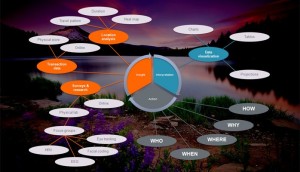Data-Driven Power Clusters
Data-Driven Power Clusters
Snorri H. Gdumundsson, Director and CMO, Gage-Cannon Venture Consulting Ltd.
“Today’s economic map of the world is characterized by “clusters.” A cluster is a geographic concentration of related companies, organizations, and institutions in a particular field that can be present in a region, state, or nation. Clusters arise because they raise a company’s productivity, which is influenced by local assets and the presence of like firms, institutions, and infrastructure that surround it.” Institute for Strategy & Competitiveness, Harvard Business School
Although data management and utilization is a key concern for cluster operations, few clusters truly harness the data generating and customer engagement abilities of its members. Among reasons are the inability of clusters to envision what type of framework is needed, the resistance among members to adopt and learn new technologies, competitive restrictions, and privacy regulations.
During the past months, we have been exploring a centralized marketing technology framework that addresses these concerns in the attempt to overcome the obstacles preventing clusters from being data-driven powerhouses. There is much to gain as cluster member benefits include:
- Greater targeting accuracy.
- More cross-selling opportunities.
- Increased marketing ROI.
- Higher profitability.
- Stronger market position.
In order for cluster members to be able to efficiently monitor, understand, and engage customers with relevant messages and promotional materials, a strong customer intelligence solution needs to take center stage. The ideal solution offers real-time marketing automation by bridging online and physical store environments and contains:
- A central customer repository that is updated in real-time from all channels.
- An omnichannel engagement engine that enables targeted personalized and contextual customer communication in consistent and contiguous manner via the right channel, whether it’s the in-store POS, kiosks, web, mobile apps, Facebook or e-mail.
- Tracking and response to every customer interaction and sale transaction, indoor mobile location (beacon based), web- or email-clicks, and offer redemption for precision targeting.
- Advanced analytics and insights into each individual customer to drive inbound and outbound marketing across all channels.
- Efficient actionable generic customer knowledge models including RFM, customer lifestyle DNA, top cross-selling items, and basic churn that are ready to be harvested by the engagement engines.
- Extensible architecture supporting the addition of external specialized apps and recommenders to further harness the power of centralized customer intelligence.
With this core in place, understanding what external data visualization and engagement technologies are needed to empower the cluster becomes clearer. Adding POS and POI engagement, Augmented Reality, Neuromarketing, Facial Recognition, Content Marketing, Customer Loyalty, and Smartphone Location Analysis to a clearly defined customer intelligence platform is easier than approaching each technology independently and has far greater impact on cluster operations.
